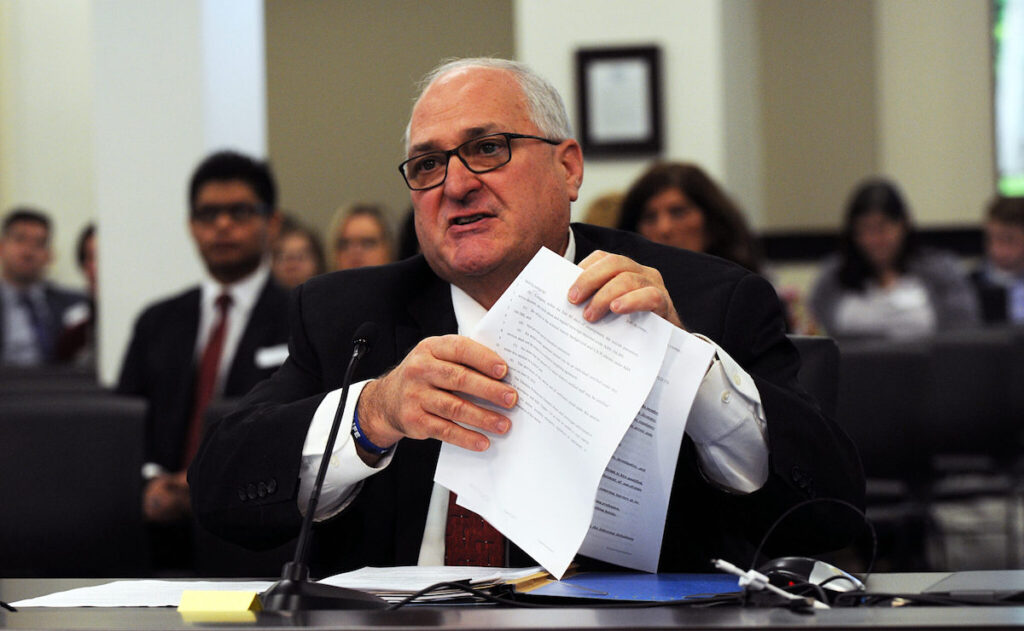FRANKFORT, Ky. — A Kentucky House committee forwarded a bill that academics warn could erode faculty tenure at the state’s public universities and colleges. Meanwhile, the Republican sponsor repeatedly said the bill “is not about tenure.”
If it passes the General Assembly this year, House Bill 424 would give universities and colleges the ability to remove faculty members and presidents for not meeting “performance and productivity requirements” set by the institutions’ boards. The bill would require faculty and presidents to be evaluated at least once every four years.
The House Committee on Postsecondary Education adopted a committee substitute version of the bill during its Tuesday meeting. The bill now reads that “no person shall receive an employment contract” for more than four years at an institution of higher education. It previously said no employment contracts could be offered for more than four years “except full-time faculty members may, in lieu of receiving tenure if offered by the public postsecondary institution, receive an employment contract for up to six years.”

The sponsor of the legislation, committee Chair James Tipton, R-Taylorsville, introduced a similar bill last year though he did not seek a committee vote on it. During Tuesday’s meeting, he testified that he had gotten a suggestion to include a definition of tenure in the bill, but “I really could not come up with a good definition for tenure that I felt comfortable putting in statute.”
“I felt like it was best to leave that definition up to each individual public postsecondary institution to define tenure on their own campus, because this bill is not about tenure,” Tipton said. “This is about employment contracts.”
However, multiple professors — both who testified Tuesday with United Campus Workers of Kentucky and spoke to the Kentucky Lantern ahead of the meeting — warned that Tipton’s proposal could erode tenure at Kentucky universities. Down the road, the bill could make it harder to recruit and retain faculty who are seeking benefits that tenured positions offer, they say.
According to the American Association of University Professors, a tenured position “is an indefinite appointment that can be terminated only for cause or under extraordinary circumstances such as financial exigency and program discontinuation.”
‘A process of eroding tenure’
Julie Cyzewski, an associate professor at Murray State University, told the committee that the tenure process is a “rigorous one” that requires feedback from colleagues and administrators — and she had just completed that process herself. She said Tipton’s bill “would deeply complicate and confuse the process of teaching and running the university” and the process laid out in the bill was “very arbitrary,” which could jeopardize student learning.
“Removing tenure protections removes protections for faculty to conduct research and teach free from outside influence. This risks undermining the reputation of Kentucky’s public higher ed system and puts student success at risk,” Cyzewski said. “Murray State in particular, as all of our institutions, need to recruit and retain high quality faculty in order to continue to offer our students an excellent education that prepares them for their future.”
Bills to pave the way for new graduate programs at Murray State, as well as Western Kentucky University and Eastern Kentucky University, have been filed in both the House and Senate. A study by Deloitte Consulting reviewed by lawmakers in November highlighted that the universities would have to make some hires or rely on existing faculty for the new programs, depending on the degrees planned.
Bernadette Barton, a professor at Morehead State University, told the committee that the bill could establish “a process of eroding tenure” and give university boards and presidents the power to “terminate faculty for possibly ideological reasons.” She said tenured faculty, including herself, at Morehead State go through annual reviews.
Ahead of the meeting, Karen Petrone, a professor and president of the American Association of University Professors chapter at the University of Kentucky, told the Lantern said that the chapter shares a goal of Tipton’s — making education in Kentucky the best that it can be. However, the chapter is opposed to centralizing the faculty review process.
Petrone said that the bill does not outright eliminate tenure, but “there’s a danger of erosion of tenure.”
“To know what is actually the proper way to evaluate somebody, you need to be close to them to understand what the norms are in their particular fields,” Petrone said. “And I think that the danger of a bill like this is to go at the flyover level, where the board of trustees or the president doesn’t even necessarily know how to evaluate the faculty, whereas the faculty who are alongside those faculty in that same field do understand how to evaluate them.”
UK’s administration and faculty members are already at odds over a change in shared governance at the university that took effect over the summer. The Board of Trustees voted to replace the University Senate with a faculty senate that professors argued stripped them of power over academic decisions.
Petrone said a bill like Tipton’s could raise anxiety on campus about faculty evaluations if it passes because an “adequate faculty voice” may not be able to articulate how the new evaluations should be carried out and the guard rails for due process have recently changed.
Katy Varner, the executive director of American Federation of Teachers Local 1360, which represents Kentucky Community and Technical College System employees, wrote in an email before the meeting that the bill is “dangerous legislation” as it could pave the way for faculty members to be fired for not meeting productivity standards that would be hard to define because their mission is not mass production but educating students.
“The idea that a tenure track professor has a job for life is a myth,” Varner said. “Higher ed professors can and do lose their positions for various reasons; the failure to execute the terms of their contract, non-compliance with federal or state laws and conviction of a crime are some examples. Tenure protects a professor’s right to free speech and to question the status quo if necessary.
Tenure should protect a professor against racial, ethnic, gender, and age discrimination. Tenure helps ensure the right to due process. Tenure helps students learn about and think about ideas that may not be currently politically popular.”
Nevertheless, the bill does have some supporters. Michael Frazier, the executive director of the Kentucky Student Rights Coalition, told the committee on Tuesday that the coalition supports the bill because it “does closely protect academic freedom” while ensuring that the “status quo of higher education does not remain” in the state. He argued that low income and minority students had been “disproportionately impacted by the stagnation of higher education.”
Eleven Republicans on the committee, including Tipton, voted Tuesday in favor of the bill. Two Democrats, Reps. George Brown Jr., of Lexington, and Sarah Stalker, of Louisville, voted against it. Rep. Rachel Roarx, D-Louisville, passed.
If the bill receives a favorable vote on the House floor, it could go to the Senate for further consideration.
This article is republished under a Creative Commons license from Kentucky Lantern, which is part of States Newsroom, a network of news bureaus supported by grants and a coalition of donors as a 501c(3) public charity. Kentucky Lantern maintains editorial independence. Contact Editor Jamie Lucke for questions: info@kentuckylantern.com. Follow Kentucky Lantern on Facebook and Twitter.
McKenna Horsley covers state politics for the Kentucky Lantern. She previously worked for newspapers in Huntington, West Virginia, and Frankfort, Kentucky. She is from northeastern Kentucky.






